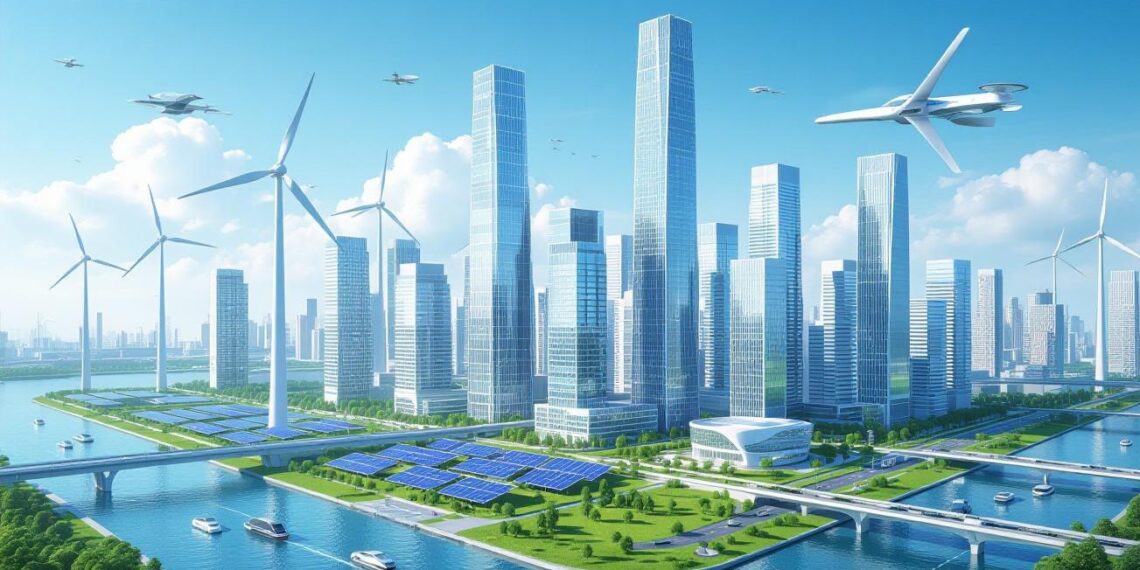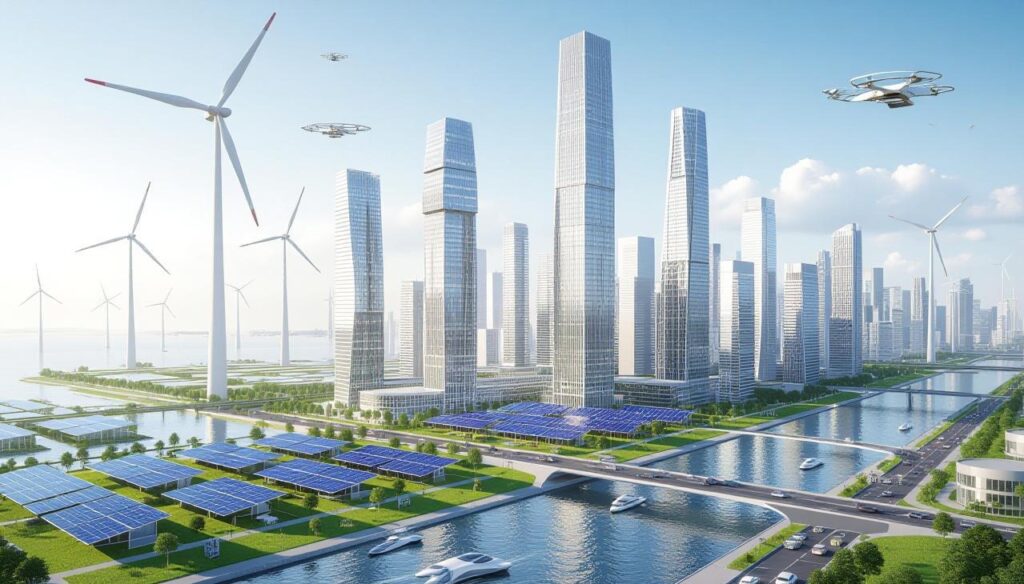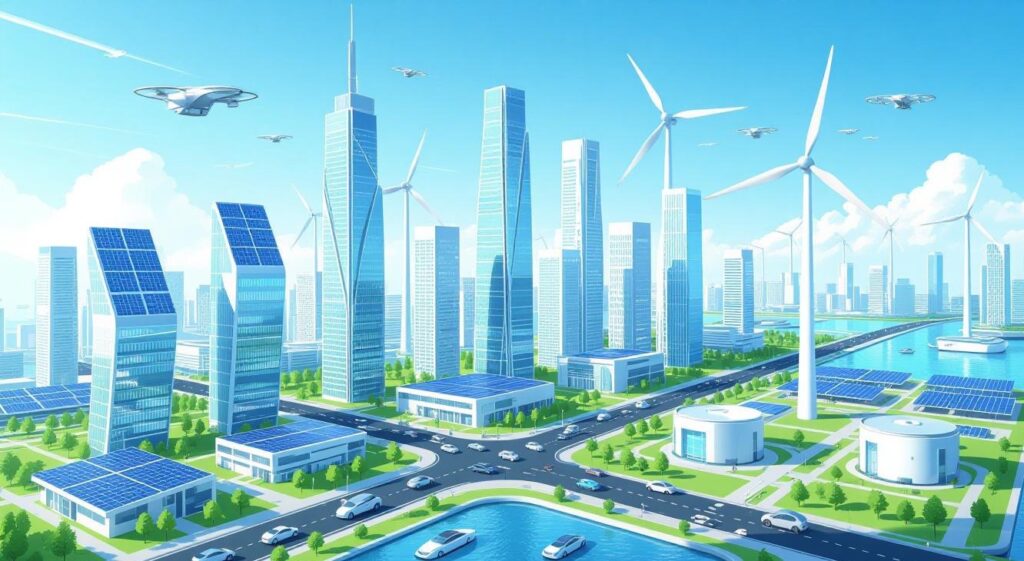The energy sector is undergoing one of the most significant transformations in modern history. Renewable energy is no longer a niche; it is the central driver of the global power mix. In 2024, clean energy powered over 40% of the world’s electricity, and the pace of growth shows no sign of slowing. Yet, while milestones are being achieved, the transition faces challenges around policy, infrastructure, and investment.
This article explores the Top Renewable Energy Trends in 2025, bringing together the latest global data, emerging technologies, investment flows, and regional case studies. By the end, you’ll have a comprehensive view of where the renewable energy sector stands today—and what to expect in the years ahead.
Global Overview of Renewable Energy in 2025
Clean Power Gains Momentum
According to the Global Electricity Review 2025, clean energy accounted for more than 40.9% of global electricity in 2024, with solar and wind being the fastest-growing sources. Solar power alone doubled its share within three years, becoming the single largest driver of renewable capacity additions.
Wind and solar contributed three-quarters of all new renewable generation worldwide, while hydropower maintained a steady but slower growth trajectory. Despite these gains, coal and gas still supply over half of the world’s electricity, demonstrating the urgent need for accelerated decarbonization.
Record Capacity Additions
Globally, 740 gigawatts (GW) of renewable power capacity were added in 2024—a record-breaking figure. However, the REN21 Global Status Report emphasizes that this pace is still short of what is required to reach international climate targets. To align with the International Energy Agency’s 2030 goals, annual capacity additions would need to double.
Investment Surges but Unevenly
Renewable energy investment rose to $728 billion in 2024, up 8% from the previous year. While this is a positive signal, the growth rate is slowing compared to the rapid increases of earlier years. Top Renewable Energy Trends in 2025 Moreover, investment distribution remains uneven: developed economies dominate renewable financing, while developing countries continue to struggle with capital access despite immense solar and wind potential.
Key Technology Trends Shaping 2025
Innovation lies at the heart of the renewable energy boom. In 2025, several breakthroughs are redefining efficiency, cost, and scalability.
Solar Power at the Forefront
-
Perovskite Solar Cells: Perovskite tandem technology is pushing solar efficiency beyond 30%, potentially replacing traditional silicon as the dominant material in photovoltaic modules.
-
Black Metal-Enhanced Thermoelectrics: Recent advances in solar thermoelectric generators (STEGs) using nanostructured black metal coatings have achieved efficiency improvements up to 15 times higher than earlier models.
-
Heterojunction (HJT) Modules: Combining crystalline silicon with amorphous layers, HJT cells are delivering higher yields, especially in hot climates where conventional solar loses performance.
Green Hydrogen Becomes Viable
Electrolyzer costs have fallen sharply, making green hydrogen production increasingly competitive. Countries such as Germany, Japan, and Australia are investing heavily in hydrogen infrastructure to decarbonize industries that cannot easily electrify, such as steel and aviation.
Digitalization and Artificial Intelligence
Energy companies are deploying AI-powered platforms for grid forecasting, plant optimization, and predictive maintenance. From dynamic solar farm layout design to AI-driven demand management, digital tools are now indispensable in managing the complexity of renewable systems.
Next-Generation Wind Turbines
-
Offshore wind continues to scale, with turbines now exceeding 18 MW capacity.
-
Floating wind farms are expanding beyond Europe to Asia-Pacific, enabling deployment in deep waters previously unsuitable for fixed-bottom turbines.
Regional Perspectives
India: Clean Power Outpaces Fossil Fuels
India’s clean power generation surged by 20% in the first half of 2025, marking a turning point where coal and gas generation began to decline. Strong government policies, favorable auctions, and rapid solar expansion have positioned India as a leader in renewable adoption among emerging economies. Top Renewable Energy Trends in 2025.
United States: Wind and Solar Surpass Coal
For the first time, wind and solar generation in the United States overtook coal in 2024. Solar grew by 27% year-over-year, while coal declined to its lowest share in over half a century. Federal tax incentives and state-level mandates have played a crucial role in this shift.
Africa: Solar Imports Surge
Africa increased solar panel imports by 60% in 2024, signaling strong momentum. Yet renewables still make up only around 6% of the continent’s electricity generation. Challenges include financing, grid infrastructure, and political stability. However, with abundant natural resources, Africa has one of the highest potentials for renewable growth this decade.
Europe: Driving Offshore Wind and Hydrogen
Europe remains a frontrunner in offshore wind and green hydrogen. The North Sea continues to host mega-scale wind projects, while countries like the Netherlands and Denmark are building cross-border hydrogen hubs to serve both industry and transportation.
Investment and Finance Landscape
Public and Private Capital
KPMG’s 2025 Energy Transition Investment Outlook reveals that over 65% of energy companies are prioritizing efficiency and renewable deployment. Top Renewable Energy Trends in 2025. Public-private partnerships are expanding, especially in infrastructure development such as grid modernization and hydrogen networks.
Cost Competitiveness
UN reports show that renewables are now cheaper than fossil fuels in most regions:
-
Solar: 41% cheaper than coal and gas equivalents.
-
Onshore wind: 53% cheaper.
This cost advantage is driving a structural shift in how energy systems are financed and deployed.
Barriers to Investment
Despite falling costs, barriers persist:
-
High interest rates in some regions raise project financing costs.
-
Supply chain dependencies, especially for rare earth elements and solar modules, create geopolitical vulnerabilities.
-
Permitting and regulatory delays slow project rollouts, especially in the U.S. and Europe.
Policy and Infrastructure Challenges
Policy Volatility
Trade tensions and shifting policies are significant risks. For example, recent U.S. tariffs on clean energy imports could delay solar deployments despite federal incentives. Meanwhile, in some regions, fossil fuel subsidies remain in place, undercutting renewable competitiveness.
Grid Modernization
Integrating intermittent renewables requires flexible and robust grids. Energy storage, interconnections, and smart grid technologies are becoming essential to balance demand and supply. Without urgent infrastructure upgrades, many regions risk bottlenecks that limit renewable penetration.
Storage Solutions
Battery storage is growing rapidly, with lithium-ion prices falling more than 80% over the past decade. Beyond batteries, new storage methods like pumped hydro, compressed air, and thermal storage are being deployed at scale.
Looking Ahead: What to Expect Beyond 2025
Solar to Lead Renewables
By the late 2020s, solar PV is expected to surpass both wind and hydropower to become the dominant renewable source. Its scalability and cost profile make it the fastest-growing energy technology in history. Top Renewable Energy Trends in 2025.
Hydrogen Integration
Hydrogen will increasingly complement electrification, powering industrial sectors, shipping, and heavy-duty transport. Expect hydrogen corridors and international trade in green hydrogen to expand rapidly.
AI and Decentralized Energy
Artificial intelligence and blockchain-based energy trading platforms will foster decentralized energy systems. Consumers will become “prosumers,” generating and selling electricity directly into local grids.
Resilience and Security
With rising climate risks, energy systems must not only decarbonize but also adapt for resilience. Microgrids, distributed storage, and localized renewables will help communities withstand disruptions from extreme weather and cyber threats.
FAQs
1. Why is 2025 a pivotal year for renewable energy?
Because global clean power has reached more than 40% of electricity, new technologies are maturing, and investment flows are reshaping the energy landscape.
2. What is the most important renewable energy technology in 2025?
Solar power leads in terms of scale and innovation, but hydrogen and storage technologies are equally crucial for long-term decarbonization.
3. Which countries are leading the renewable transition?
China remains the largest installer of renewables, but India, the U.S., and the EU are showing rapid progress. Emerging economies like Brazil and South Africa are also scaling up.
4. Are renewable energy costs still falling?
Yes. Both solar and wind are now significantly cheaper than fossil fuels, and battery storage continues to decline in cost, making renewables the most competitive form of power in many regions.
5. What are the biggest obstacles to renewable growth?
Policy uncertainty, infrastructure limitations, and uneven investment remain the key challenges slowing down faster deployment.
Conclusion
The Top Renewable Energy Trends in 2025 reveal a sector that is simultaneously breaking records and confronting challenges. Solar and wind are scaling faster than ever, investment is growing, and new technologies like green hydrogen and AI are reshaping the future. At the same time, infrastructure gaps, uneven financing, and policy volatility continue to slow the pace of transition.
The years ahead will determine whether the world can meet its climate goals. With bold action from governments, businesses, and communities, renewables have the potential not only to power economies but to secure a cleaner, more resilient future.











